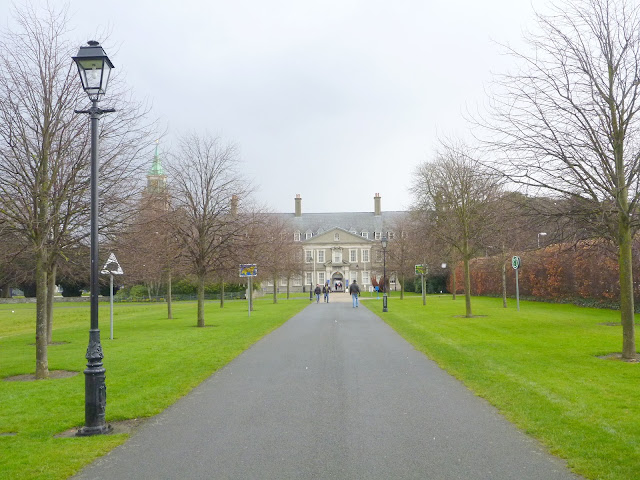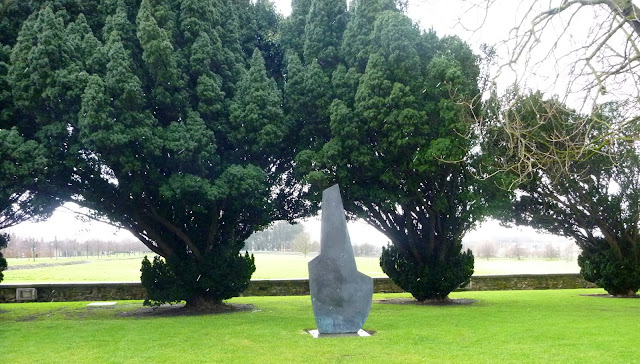Irish Museum of Modern Art, Dublin.
Walking up the long avenue, whipped by the cold wind, the sun came out and the light was incredible
dark grey threatening sky and soon after it started snowing again.
The grand old building was closed unfortunately, with only a small wing open
217.5o, Arc x 12, Bernar Venet
Sentinel VIII, Catherine Lee, 1999
Byzantine, Janet Mullarney, 2012
We did not visit the magnificent gardens as it had started snowing again, but instead walked on to the back of the building
for the Analysing Cubism exhibition.
The exhibition focuses on the continental milieu in which Irish artists worked in the 1920s and 30s, taking its title from the early years of the movement, sometimes referred to as 'Analytical Cubism', but extends its scope to the end of WWII, a watershed in modern art when the focus shifted from Paris to New York. The exhibition looks at the work of a number of pioneering Irish artists who travelled to France and further afield to study modern art, seeking to place these artists in context.
It focuses on Irish painters May Guinness, Jack Hanlon, Evie Hone, Mainie Jellett, Norah McGuinness and Mary Swanzy and on their English counterparts Paul Egerstorff and Elizabeth Rivers. It also includes work by European painters such as Geroges Braque, Albert Gleizes, Juan Gris, Henri Hayden, Andre Lhote and Pablo Picasso.
Decoration, Mainie Jellett.
This was first shown at the Society of Dublin Painters in 1923. Believed to be the first abstract painting by an Irish artist to be exhibited in Dublin, it was met with hostility and was reviewed in the Irish Times as a 'freak picture', an 'insoluble puzzle', 'sub-human', 'indicative of artistic malaria'.
The work consists of layers of patterns and shapes overlaid on one another, and shows the first elements of 'translation and rotation', the rules for Cubism as developed by Gleizes, Jellet and Hone around this time. It is a brave and modern work, yet the use of gold leaf, tempera and the icon-like format of the canvas speak of an interest in, and reverence for, the works of early Renaissance masters.
Figural Composition, Evie Hone, 1929
Composition, Evie Hone, 1927-28
Le Village, Mary Swanzy, 1920s
Peasant Woman on Pathway, Mary Swanzy, 1930
Les Pins, Andre Lothe
Aran Landscape, Elizabeth Rivers, 1955
Danseuse Espagnole, Albert Gleizes, 1916
Lady in Interior, Andre Lhote, 1935
Femme das sas cuisine, Andre Lhote, 1935-40
Two Irish Girls, May Guinness, 1925
Nu Assis, Andre Lhote, 1948
Woman with White Bonnet, Mary Swanzy, 1920
The star of the show
Cubist Landscape with Red Pagoda and Bridge, Mary Swanzy, 1926-28
Oil Painting a la Mode d'Andre Lhote, Mary Swanzy
Garden Green, Nora MacGuinness, 1962
Seated Female Nude, Mainie Jellett, 1921-22
Nude in Landscape, Mainie Jellett, 1921
Bathers, Mainie Jellett, 1922
Pierrot, Juan Gris, 1921.

















No comments:
Post a Comment